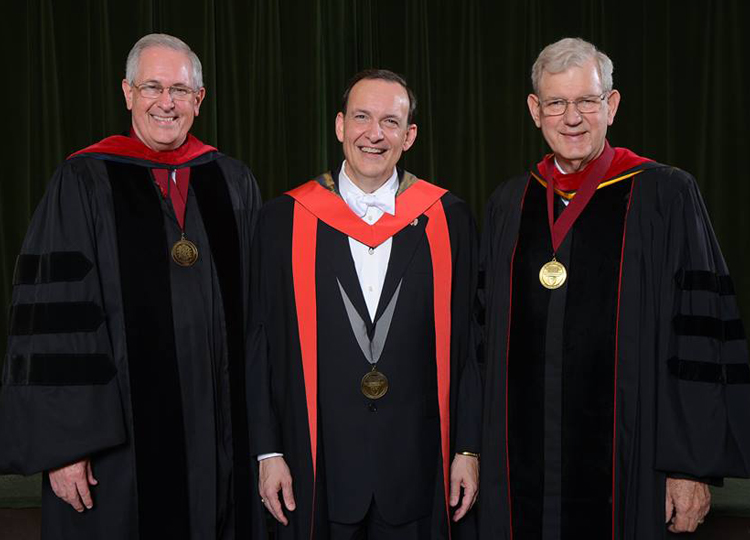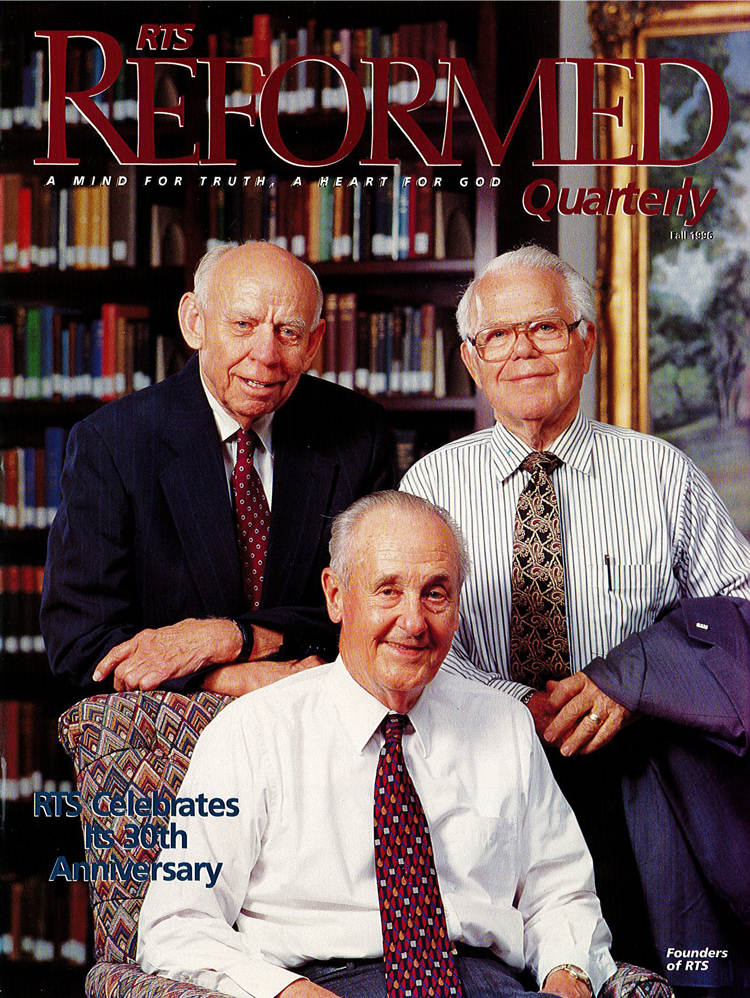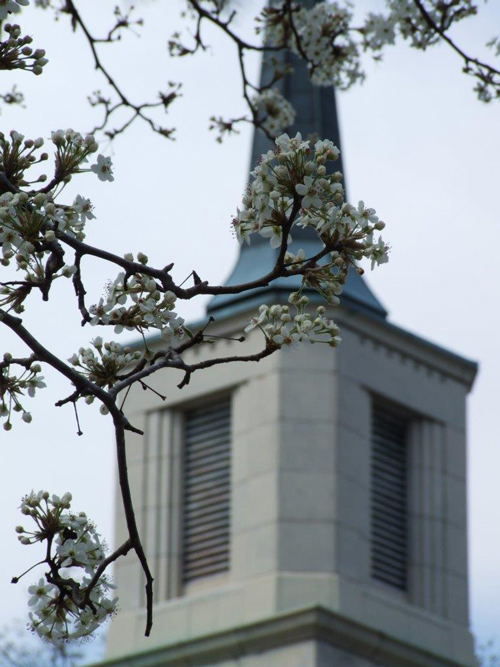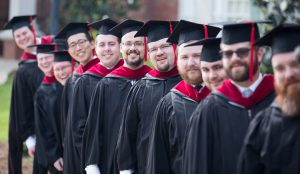By Marilyn Tinnin
Reformed Theological Seminary Celebrates 50 Years
Anniversaries are occasions for reflection as well as celebration, milestones that mark how far we’ve come, and also how far we hope to go. Reformed Theological Seminary (RTS) in Jackson marks fifty years this month. Weekend festivities October 6 and 7 promise to bring together all the best elements of shared memories, common goals, and renewed and refreshed commitments to the Eternal God whose hand has faithfully guided its path.
RTS opened its doors in 1966 in a large refurbished home on Clinton Boulevard with a student body of fourteen and a faculty of five.
To truly understand its founding, you have to go back twenty years earlier and consider the influence of “The Greatest Generation.” A few local veterans—young men—went off to World War II soon after Pearl Harbor and returned a few years later to find the church was not the same church it had been when they left. The Reformed faith they had confessed since their cradle days was being influenced by a new wave of progressive and social philosophies. The new way of thinking was becoming increasingly out of step with the orthodox views of Biblical inerrancy.

Chancellors—past and present—who have led the growing seminary. (L to R) Dr. Ric Cannada (2002–2012), Present Chancellor Dr. Ligon Duncan, and Dr. Luder Whitlock (1978–2001)
For those who had embraced Reformed theology, there was also a great drift away from the Westminster Confession, which lays down the biblical explanation for all that the Reformed faith professes. The late Bob Cannada, then a young attorney, was one who returned to find himself conscripted as Superintendent of Jackson’s First Presbyterian Church’s Sunday School program, a post he faithfully served for over 25 years.
His son, Ric Cannada, Chancellor Emeritus of RTS, remembers that his father was gravely concerned about the lack of Biblical instruction in the denominational literature that was pumped out by the Presbyterian Church in America (PCUS) at the time. Ric says, “He even went to Los Angeles to meet with Mrs. Henrietta Mears of the Hollywood Presbyterian Church.” (This in an age when air travel was not an everyday thing!) “She had begun Gospel Light literature.” It was Biblical. It was truth. Cannada came back to Jackson and successfully recommended that First Presbyterian discard the PCUS curriculum and adopt Gospel Light.
But the theological difference of opinion between the Bible-believing churches and the evolving arm of the denomination that had “outgrown” Biblical inerrancy continued to churn.
The late Mr. Erskine Wells, also a veteran of WWII, was a lifelong member of Jackson’s First Presbyterian Church. Like Bob Cannada, he bemoaned the direction of his denomination. He was also a young leader in the church. He was busy in 1963 on the day one Reverend Sam Patterson, pastor of French Camp Presbyterian Church, dropped by his law office unannounced and explained his dream of a new seminary that would be true to the Reformed Faith.
Mr. Wells listened patiently. At first he dismissed the idea, certain that God was not calling him, a layman, to jump into building a seminary. After all, what in the world did a former Marine, now attorney, know about starting a seminary?
And then, Sam Patterson asked a question that was the impetus for RTS, “Erskine, how big is your God?” He leaned back, thought a minute and said, “Sam, when do we start?” The fact that he went forward speaks volumes about his commitment to the God he served. He was in.

Three men of faith, founders (L to R) Mr. Erskine Wells, Mr. Robert Cannada, and Mr. Frank Horton.
Tom Brokaw, in his best seller The Greatest Generation, suggests that those great Americans who fought in World War II had a value system that included personal responsibility, duty, honor and faith. Many of them came home from saving the world to find a nation that needed a certain rebuild of its own. Such was true of the five founders of RTS. They were servants, not self-serving seekers of their own pleasure.
Three other laymen are credited with taking Sam Patterson’s vision and accepting the call.
Frank Tindall was a Navy veteran, a retired lieutenant commander. He was a farmer and a key civic leader in Indianola. Robert Kennington, a retired Jackson businessman and owner of a very fine department store on Capitol Street, and Frank Horton, an Air Force veteran, attorney, and elder in the Presbyterian church in Clinton, were also willing to take this leap of faith.
And it was that—a leap of faith.
As Ric Cannada explains, “It was clearly a spiritual and biblical issue for them. The original vision of RTS was to bring revival to the Southern Presbyterian Church (PCUS), to put Bible believing preachers in that denomination who would turn it around theologically and spiritually, and bring it back to its roots.”
 Would anyone enroll? Could they raise enough money to keep it going? And if they graduated students, would they be accepted by presbyteries and be able to find churches willing to hire them? These were legitimate questions. They did not know.
Would anyone enroll? Could they raise enough money to keep it going? And if they graduated students, would they be accepted by presbyteries and be able to find churches willing to hire them? These were legitimate questions. They did not know.
The founders stepped out on faith, offered the best of their talents and expertise along with humble spirits and fervent prayer, rolled up their sleeves and began. Each of them was quoted more than once saying, “We did not really know what we were doing.” Their faith was in God, and He did not disappoint. How big was their God? He proved to them that He was indeed very big. He was the Ephesians 3: 20 God—on steroids.
From their first group of fourteen students have come thousands who are faithful to the scriptures and passionate to disciple others in accord with the Great Commission. RTS graduates are sent out with a mindset of love and service and a desire to be a faithful voice of God’s truth in every day culture.
Today, RTS can boast of actual campuses in Atlanta, Charlotte, Jackson, Orlando, and Washington, D.C. There are also extension sites in Memphis, Houston, and New York City and a global presence that allows students all over the world to receive a world-class seminary education online. Additionally, there is a doctoral program in conjunction with Brazil’s Mackenzie University and a new effort to help establish the Center for Reformed Theology at the Universitas Pelita Harapan in Jakarta, Indonesia.
Current Chancellor Ligon Duncan talks about RTS’s place in our present culture realistically, but positively. There are challenges. He readily counts several.
He is very sensitive to the cost of a top-flight education that prepares graduates to preach and teach in today’s world. Many students arrive with significant student debt. “Only our supporters can help us there,” he says. It is worth noting that RTS gives a greater percentage of scholarship to their students than any of their peer institutions do. They are 100% committed to staffing churches with Bible-believing preachers!
 And then, there’s this: “Staying faithful while loving our neighbors in an increasingly antagonistic climate is a big challenge. We also have to make a case in our day for rigorous, reverent graduate theological education,” he says.
And then, there’s this: “Staying faithful while loving our neighbors in an increasingly antagonistic climate is a big challenge. We also have to make a case in our day for rigorous, reverent graduate theological education,” he says.
Theology matters in an age of loud competing voices that discount the Bible as having any relevance to our modern world at all. RTS is indeed a bright light—as true today as it was in the day of its founding.
But then, it took its inspiration from the One who inspired Believers through the ages when He said,
“You are the salt of the earth. But if the salt loses its saltiness, how can it be made salty again? It is no longer good for anything, except to be thrown out and trampled underfoot. You are the light of the world. A town built on a hill cannot be hidden. Neither do people light a lamp and put it under a bowl. Instead they put it on its stand, and it gives light to everyone in the house. In the same way, let your light shine before others, that they may see your good deeds and glorify your Father in heaven.”
For more information visit www.rts.edu.

